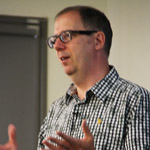Interview with Victor Lamme

This post-lecture interview was conducted during the BCBT Summerschool held at the Universitat Pompeu Fabra, Barcelona, september 2010.
The current definition of what consciousness is, is unsatisfactory according to Victor Lamme. He proposes to put aside the emphasis on the descriptions from introspection and psychology, and build a new definition from a neuroscientific perspective. This approach could offer a more thorough way to assess the 'grey zone' between the polar states of being completely conscious, and being completely unconscious, like during coma. The approach also offers a method to disambiguate the role of attention in tasks associated with more or less conscious states. With Paul Veschure Lamme discusses his views with respect to his research on change blindness and subconscious recognition, and role of the feed-forward recurrent connectivity architectures, which make him a critic of global workspace proposals. Lamme thinks that it is fundamentally impossible to know what exactly someone else is conscious of at a certain moment. He expects that the contribution of experimentation will show that the neural argument of recurrence will prove an essential prerequisite for consciousness phenomena.
About the lecturerVictor Lamme is professor at the University of Amsterdam. He studies visual consciousness to understand how we process visual information. This is \u2013sometimes\u2013 accompanied by a sensation: we see. What brain mechanisms make that happen?